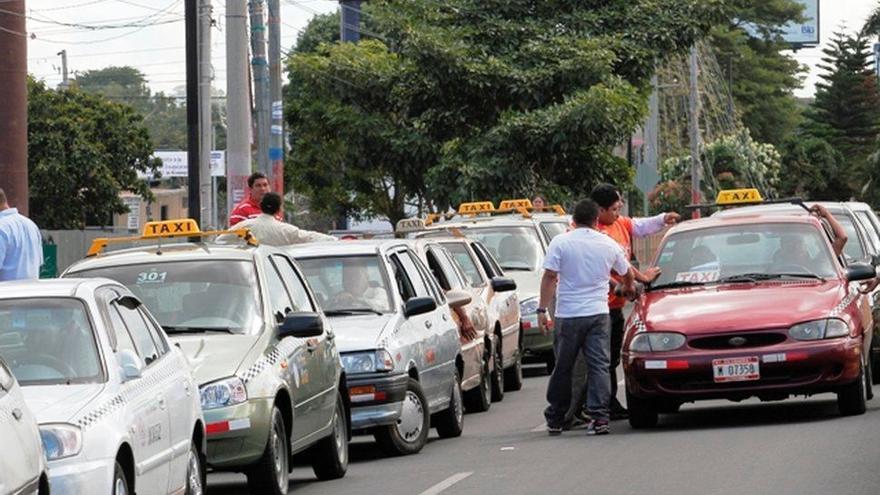
![]() 14ymedio, Havana, 9 November 2023 — Nicaraguan authorities have prohibited taxi drivers from transporting migrants from Cuba, Haiti and African countries from Augusto César Sandino airport, in Managua, to the border with Honduras. According to the newspaper La Prensa, the drivers say that this is another strategy of the Government to “take private business out of the game” and monopolize the income generated by the passage of migrants.
14ymedio, Havana, 9 November 2023 — Nicaraguan authorities have prohibited taxi drivers from transporting migrants from Cuba, Haiti and African countries from Augusto César Sandino airport, in Managua, to the border with Honduras. According to the newspaper La Prensa, the drivers say that this is another strategy of the Government to “take private business out of the game” and monopolize the income generated by the passage of migrants.
“What I know informally from my neighbor, who has been dedicated to those trips for more than a year, is that yes, indeed, since last week, airport staff is preventing them from taking people to the border,” confirms Julio, a collaborator of 14ymedio in Nicaragua, who has been following the situation.
“They are even being prevented from accessing the gas station in front of the airport, which is where Cubans used to board the vehicles,” he adds.
Julio explains that the measure does not surprise him. “It’s not just now; in any case what they are doing is removing the private taxis, because since the exodus began the Government has been directly involved in the transfer of migrants,” he says.
“It’s not just now; in any case what they are doing is removing the private taxis, because since the exodus began the Government has been directly involved in the transfer of migrants”
Interviewed by the newspaper La Prensa, many of the taxi drivers were annoyed with the sparse explanations of the agents who expel them from the surroundings of the air terminal. “Now the police send patrols around, looking for how to fine you. You can’t make the trip, you can’t go to the airport, if you park two kilometers away and want to enter on foot they won’t let you, they’ll remove you. They tell you that you have to leave, that you have no permission, and the only thing they know how to say is that ’they have higher orders’ and are doing their job,” says one of the drivers.
According to the taxi drivers, the police authorities, the Ministry of Infrastructure and the Transport Regulatory Institute maintain that everything is due to “relaxation” with the transportation of migrants and complaints from taxi drivers who officially operate in the terminal. “It’s not like that, they are doing their job,” refutes one of the drivers.
Actually, they say, they are displacing them because “the Government or I don’t know which officials are looking for how to seize that income. They want to provide buses; they want to take over and that’s why they give us so many excuses and restrictions,” he adds.
The taxi drivers explained that the authorities are exaggerating the situation because, although it is true that many drivers did not leave until they found a safe trip with migrants, in reality they were all working without causing problems.
“Everyone made their best offer and since there were many of us, it seemed okay. Now we are all harmed and figuring out how to solve the problem,” he said.
“The taxi drivers’ union has not wanted to protest because there is fear; there is fear that they will put you in jail,” he continues. However, it becomes increasingly difficult to get customers, and when they manage it and are discovered, they pull them out of the taxi.
The drivers explain that, as an alternative, they have had to look for private places to park, usually restaurants where they eat some food to justify parking and then walk to the airport in search of customers.
The taxi drivers’ union has not wanted to protest because there is fear; there is fear that they will put you in jail
“They are taking away the daily bread for our families, because that generated money for us. This harms us financially because living in Nicaragua is not cheap,” they say. Normally, each taxi driver made between three and four trips a week to the border to transfer migrants and charged 50 dollars per person to Africans, Haitians and Cubans.
In Nicaragua, numerous businesses have been created to offer transport, accommodation and food services where almost all the customers are migrants in transit through the country. This is the case with the taxi drivers, who have established routes and prices for the transfer to the border with Honduras.
“They commonly go to Ocotal, Las Manos and sometimes Guasaule,” they say, but even this path has become difficult. “They stop you, and you don’t have to present your documents but you do have to pay 100 pesos for each police checkpoint. Imagine if there are six checkpoints. They don’t have to stop you because the migrants entered Nicaragua through the airport legally; we weren’t doing any kind of human trafficking, we’re just providing transportation,” they explain.
Translated by Regina Anavy
____________
COLLABORATE WITH OUR WORK: The 14ymedio team is committed to practicing serious journalism that reflects Cuba’s reality in all its depth. Thank you for joining us on this long journey. We invite you to continue supporting us by becoming a member of 14ymedio now. Together we can continue transforming journalism in Cuba.
